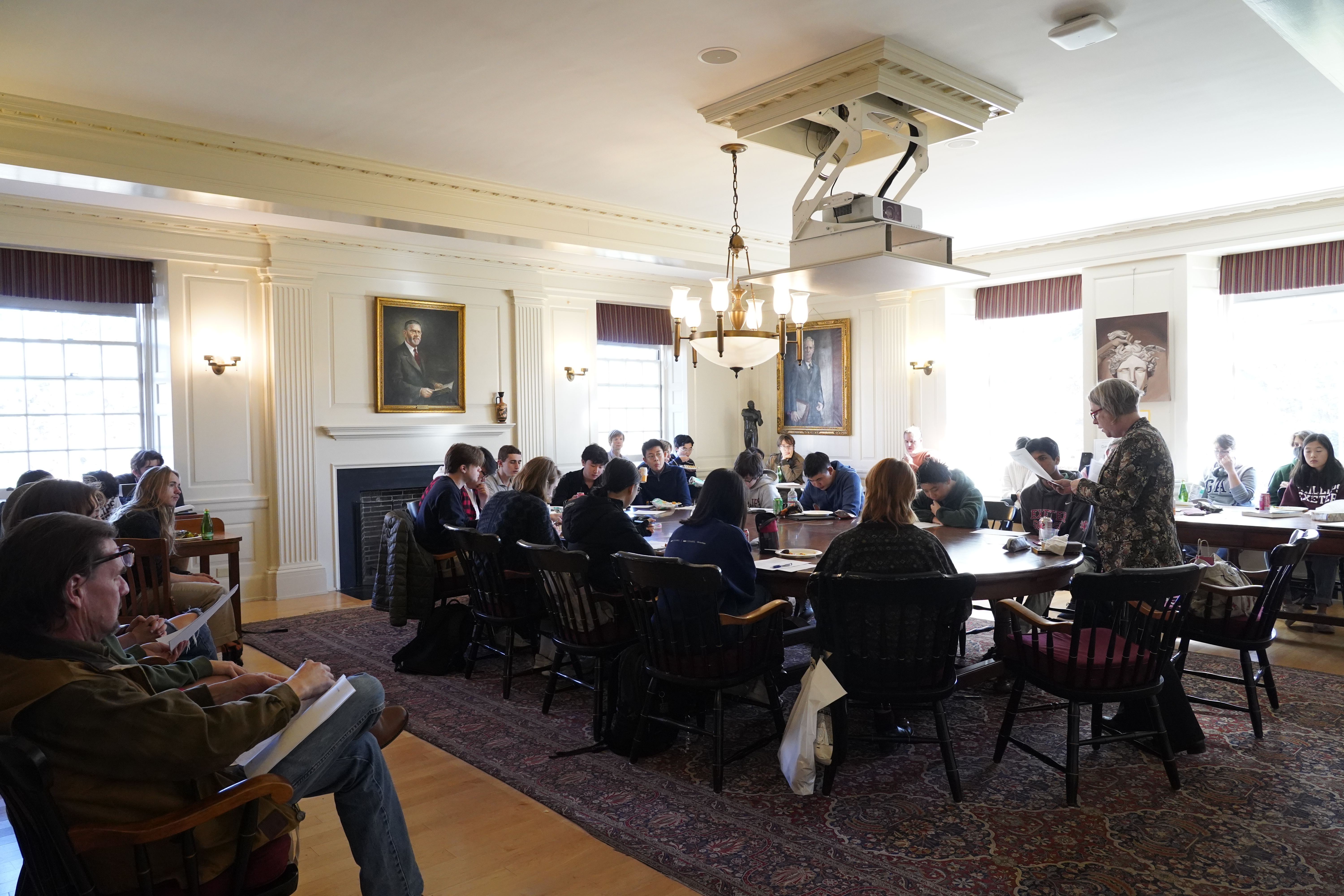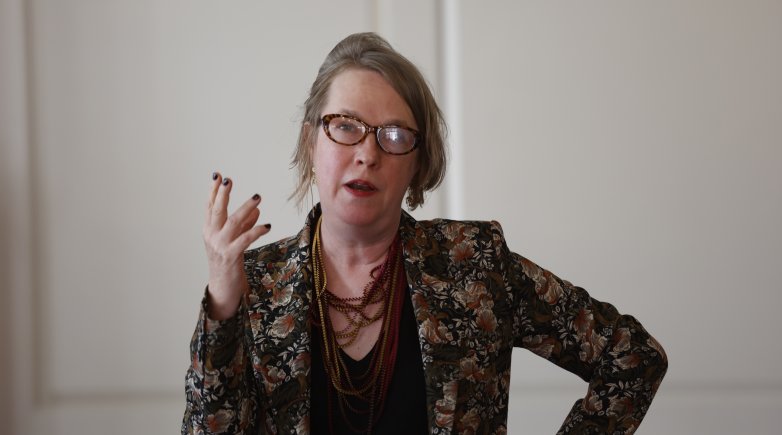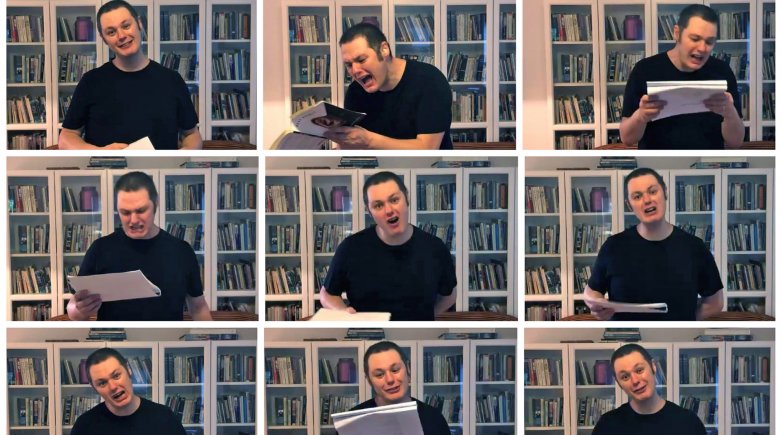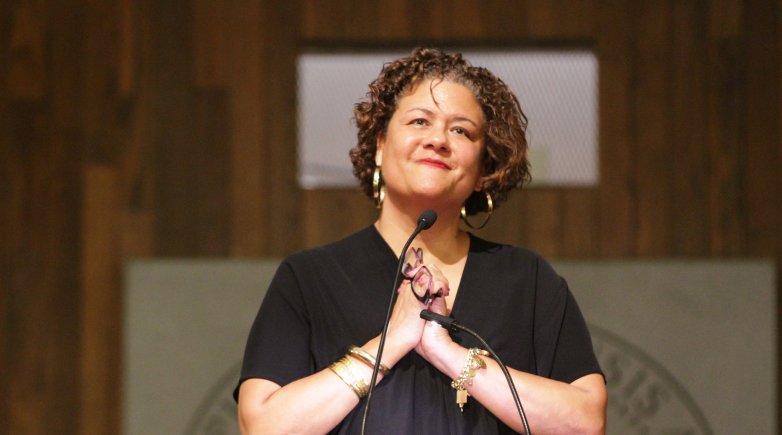5 questions for Lamont Poet A.E. Stallings
Kaylee Chen ’23 sat down with the poet and translator to discuss inspiration, elitism in the classics and how ancient Roman poetry can still seem fresh.
Award-winning poet and translator A.E. Stallings visited Exeter’s campus last week as the latest in a long line of distinguished poets to visit Exeter through the Lamont Poetry Program.
Known for her skilled use of rhyme, meter and traditional verse forms, Stallings employs frequent allusions to Greek and Roman mythology in her depictions of modern-day life. She has published four poetry collections, including Like (2018), a finalist for the Pulitzer Prize, and verse translations of works by the Roman poet Lucretius and Greek poet Hesiod, among others. The recipient of a 2011 MacArthur “genius grant,” Stallings has also held fellowships from United States Artists and the Guggenheim Foundation. A Georgia native, Stallings has lived in Athens, Greece since 1999.
In addition to a reading in Assembly Hall, Stallings worked with students and faculty in the Classics Departments during her visit. She made time to be interviewed by Kaylee Chen, a senior working toward a Classical Diploma and a fellow poet.
Could you talk a little bit about where your inspiration for writing and classics came from and what drew you to those?
I entered college knowing that I wanted to be a writer, and I was originally an English and a music major. I had not taken Latin in high school, but...I just felt like I should take Latin 101 and learn a little bit about things. I had this amazing teacher, Dr. Harris, who was very eccentric and very fun. I thought, ‘Oh, I'll take another course, then I'll take another course.’ Finally, I was taking a lot of Latin courses and the head of the classics department said, ‘Why are you majoring in English? You’re taking all these courses, come to the dark side.’ So I ended up switching my major and did not regret it, because I felt like I was getting a lot of the things that I wanted. In the literature class, we would analyze how sounds contributed to meaning and things like that. I felt it was actually very good training for being a working poet.
How does translation impact your writing process, and vice versa?
For as long as I've been writing poems, I've been doing translation…. I think you learn more about a poem from translating it than almost any other way of reading, because you can't fudge things. If something is ambiguous, you're going to have to come down on one side or the other, unless you can pull over that exact ambiguity into English. You have to think about what the cultural references are…. You think about vocabulary, you think about diction, you think about register and you think about syntax. It's a way to keep those muscles in good working order. It's [also] a way to try on different identities, learn different things, and write about things that you wouldn't write about yourself. That can open the door to possibilities. You suddenly realize, ‘Oh, maybe I could write this different kind of poem.’

You mentioned before that meter and structure are a big part of your poems. Recent creative writing movements have gravitated towards a more structureless kind of form, in which people take a lot more liberties with capitalization or punctuation or rhyme or those kinds of things. Do you have any thoughts on what kind of direction poetry in general is taking in this regard?
I think free verse will always be with us, and I think formal choices will always be with us. I think poets will kind of flow back and forth over that. The struggle is always to sound modern and contemporary…. I think it's more to do with subject matter and diction, syntax. You can write a very modern-sounding sonnet and you could write very fusty, antiquated-sounding free verse. The struggle is always to sound fresh, and that's everybody's struggle, from Keats to Shakespeare. If you're lucky, you write something that continues to sound fresh 2,000 years after you've written it. That's seen in very few cases; Catullus is one of them.
There's been a question recently as to whether classics should be studied in higher education. Because of the nature of the field, some argue that it's inherently exclusionary — race-wise, gender-wise and class-wise. Do you have any thoughts on [this]?
I think it's kind of nonsense. I'm not saying that classics hasn't been used for classist and gatekeeping purposes. Yes, it has. That's one of the reasons you have so many fantastic 19th-century women novelists, because the novel did not have the prestige of poetry. To be a poet, you had to know Greek. Keats is criticized because he doesn't really have a gentleman's classical education. Women who were not given the classical education…channeled this talent into a less prestigious genre, which they then raised to a more prestigious genre.
But what I love about classics is that wherever you study it, it's the same. I find it very democratic and anti-elitist in a sense. If I study Latin at a public high school in Georgia and I am reading Cicero, I am reading Cicero as someone at Eton is reading Cicero…. Obviously if your school does not offer Latin and so forth, then that becomes a barrier, but I don't think that has anything to do with the nature of classics in and of itself. There certainly is quite a lot of racism and classism and sexism in classics, but I think it's also open to people to grapple with that.
You said one thing you like about Catullus is that he's able to appear modern even though, clearly, he's long gone. With your own work, is that the feeling that you wish to impart to your readers?
You hope that you are speaking to someone directly, that you are speaking to your ideal reader, someone who would totally get you and get your work. But that person might be dead, or might be not yet born. The cool thing about literature is that you're having this conversation with all of the most interesting like-minded friends that you could ever have, but it's not restricted in time or space. I feel like you're speaking backwards and you're speaking forward. You hope, but again, it's out of your hands.
Kaylee Chen ’23 is a four-year senior from South Carolina. She received the American Voices Medal, one of the highest writing honors awarded in the 2022 Scholastic Art & Writing Awards competition, for her poem “How to Learn a Language.” Chen is a news editor of The Exonian and is currently pursuing a Classical Diploma at Exeter.



